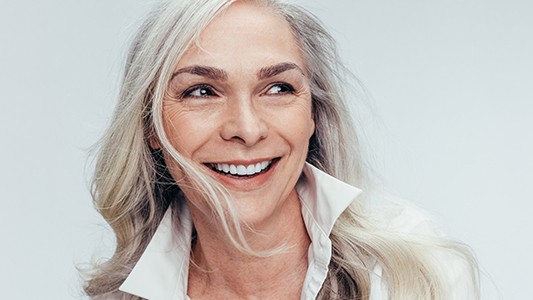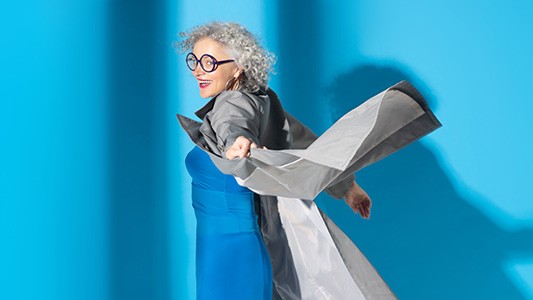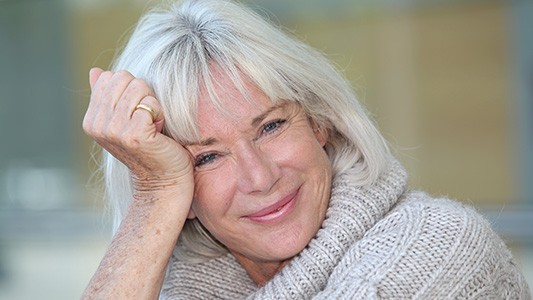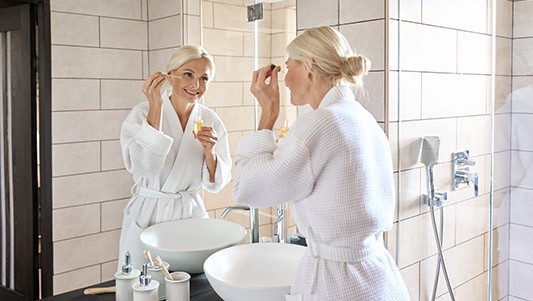4 Ways To Tell Your Skin Needs More Collagen


"There is a fountain of youth: it is your mind, your talents, the creativity you bring to your life and the lives of people you love. When you learn to tap this source, you will truly have defeated age." — Sophia Loren
Have you noticed subtle changes in your skin lately? Maybe it’s the way your cheeks feel less plump, or perhaps you caught your reflection and were shocked by the dullness.
One day, your skin felt vibrant and full of life, and now it doesn’t seem to bounce back quite like it used to. You may feel frustrated, but you’re not alone. Over time, our skin naturally evolves, often tied to a decrease in collagen production.
Collagen is the protein that gives our skin its strength and elasticity. Essentially, it’s what keeps it firm, smooth, and radiant.
But as we age, our body starts to produce less of it, leading to those small (and sometimes not-so-small) changes we notice in the mirror. The good news? With the right care and a little boost, your skin can still feel nourished, healthy, and glowing—at any age.
Let’s explore how! Here are four ways to tell if your skin is craving a collagen boost—and how you can address it.
"There is a fountain of youth: it is your mind, your talents, the creativity you bring to your life and the lives of people you love. When you learn to tap this source, you will truly have defeated age." — Sophia Loren
Have you noticed subtle changes in your skin lately? Maybe it’s the way your cheeks feel less plump, or perhaps you caught your reflection and were shocked by the dullness.
One day, your skin felt vibrant and full of life, and now it doesn’t seem to bounce back quite like it used to.
You may feel frustrated, but you’re not alone. Over time, our skin naturally evolves, often tied to a decrease in collagen production.
Collagen is the protein that gives our skin its strength and elasticity. Essentially, it’s what keeps it firm, smooth, and radiant.
But as we age, our body starts to produce less of it, leading to those small (and sometimes not-so-small) changes we notice in the mirror. The good news? With the right care and a little boost, your skin can still feel nourished, healthy, and glowing—at any age.
Let’s explore how! Here are four ways to tell if your skin is craving a collagen boost—and how you can address it.
"There is a fountain of youth: it is your mind, your talents, the creativity you bring to your life and the lives of people you love. When you learn to tap this source, you will truly have defeated age." — Sophia Loren
Have you noticed subtle changes in your skin lately? Maybe it’s the way your cheeks feel less plump, or perhaps you caught your reflection and were shocked by the dullness.
One day, your skin felt vibrant and full of life, and now it doesn’t seem to bounce back quite like it used to.
You may feel frustrated, but you’re not alone. Over time, our skin naturally evolves, often tied to a decrease in collagen production.
Collagen is the protein that gives our skin its strength and elasticity. Essentially, it’s what keeps it firm, smooth, and radiant.
But as we age, our body starts to produce less of it, leading to those small (and sometimes not-so-small) changes we notice in the mirror.
The good news? With the right care and a little boost, your skin can still feel nourished, healthy, and glowing—at any age.
Let’s explore how! Here are four ways to tell if your skin is craving a collagen boost—and how you can address it.

Increased Wrinkles
One of the first signs of reduced collagen is the appearance of wrinkles. It might start with faint creases around your eyes - crow’s feet that seem to deepen over time.
Horizontal lines across your forehead and frown lines between your brows become more prominent, making expressions linger on your face even when you’re at rest.
Even smile lines, which were once subtle, may now feel etched into your skin.
Collagen is what keeps your skin plump and smooth, so its decline naturally makes these lines more noticeable.

Increased Wrinkles
One of the first signs of reduced collagen is the appearance of wrinkles.
It might start with faint creases around your eyes - crow’s feet that seem to deepen over time.

Increased Wrinkles
One of the first signs of reduced collagen is the appearance of wrinkles.
It might start with faint creases around your eyes - crow’s feet that seem to deepen over time.
Horizontal lines across your forehead and frown lines between your brows become more prominent, making expressions linger on your face even when you’re at rest.
Even smile lines, which were once subtle, may now feel etched into your skin.
Collagen is what keeps your skin plump and smooth, so its decline naturally makes these lines more noticeable.
Horizontal lines across your forehead and frown lines between your brows become more prominent, making expressions linger on your face even when you’re at rest.
Even smile lines, which were once subtle, may now feel etched into your skin. Collagen is what keeps your skin plump and smooth, so its decline naturally makes these lines more noticeable.
Thinner Skin
Have you found that your skin seems to bruise or tear more easily? Maybe a small scrape takes longer to heal than it used to.
This fragility is a sign that your skin is thinning due to collagen loss.
You might also notice a crepey texture, especially around areas like your neck, hands, or décolletage. Skin can even lose some of its density, giving it a delicate or almost papery appearance.

These changes can feel frustrating, but understanding their root cause is the first step to addressing them.
Thinner Skin
Have you found that your skin seems to bruise or tear more easily? Maybe a small scrape takes longer to heal than it used to.
This fragility is a sign that your skin is thinning due to collagen loss.


Thinner Skin
Have you found that your skin seems to bruise or tear more easily? Maybe a small scrape takes longer to heal than it used to.
This fragility is a sign that your skin is thinning due to collagen loss.
You might also notice a crepey texture, especially around areas like your neck, hands, or décolletage.
Skin can even lose some of its density, giving it a delicate or almost papery appearance.
These changes can feel frustrating, but understanding their root cause is the first step to addressing them.
You might also notice a crepey texture, especially around areas like your neck, hands, or décolletage. Skin can even lose some of its density, giving it a delicate or almost papery appearance.
These changes can feel frustrating, but understanding their root cause is the first step to addressing them.

Loss of Firmness
As collagen levels drop, your skin’s firmness and elasticity take a hit. You may see sagging around your jawline, cheeks, or neck, which can make your face look less defined.
Areas like your under-eyes might appear sunken, and loose skin on your arms, thighs, or legs can also develop.
A clear sign of collagen loss is when your skin doesn’t bounce back quickly after being pinched or stretched, as that elasticity is closely tied to collagen levels.

Loss of Firmness
As collagen levels drop, your skin’s firmness and elasticity take a hit. You may see sagging around your jawline, cheeks, or neck, which can make your face look less defined.
Areas like your under-eyes might appear sunken, and loose skin on your arms, thighs, or legs can also develop.
A clear sign of collagen loss is when your skin doesn’t bounce back quickly after being pinched or stretched, as that elasticity is closely tied to collagen levels.

Drier Skin
Collagen also plays a big role in keeping your skin hydrated.
Without enough of it, your skin may struggle to retain moisture, leaving it feeling rough or uneven to the touch.
You might notice tightness or flaking, particularly on your cheeks, forehead, or around your nose.
Even with the best moisturizers, it can feel like your skin is always thirsty.
Replenishing collagen can help restore its natural ability to hold on to hydration.
Revitalize Your Skin with Retinol Serum
If you notice any of these signs, it’s time to support your skin by incorporating a retinol serum into your nightly routine.
Vibriance Retinol Serum works by stimulating collagen production, which can smooth out fine lines and reduce the appearance of deeper wrinkles over time.
It also encourages cell turnover, helping to shed old, damaged skin and reveal fresher, smoother layers underneath.
For the best results, apply retinol serum at night, then follow up with Vibriance Moisturizing Cream to lock in moisture. With consistent use, you’ll start to see your skin regain its firmness and glow.
Aging skin is a natural part of life, but that doesn’t mean you have to accept dullness, wrinkles, or sagging without a fight.
By recognizing the signs of collagen depletion, you can take steps to replenish it and help your skin look and feel its best.
Cheers to Positive Aging!

Loss of Firmness
As collagen levels drop, your skin’s firmness and elasticity take a hit.
You may see sagging around your jawline, cheeks, or neck, which can make your face look less defined.
Areas like your under-eyes might appear sunken, and loose skin on your arms, thighs, or legs can also develop.
A clear sign of collagen loss is when your skin doesn’t bounce back quickly after being pinched or stretched, as that elasticity is closely tied to collagen levels.
Drier Skin
Collagen also plays a big role in keeping your skin hydrated.
Without enough of it, your skin may struggle to retain moisture, leaving it feeling rough or uneven to the touch. You might notice tightness or flaking, particularly on your cheeks, forehead, or around your nose.
Even with the best moisturizers, it can feel like your skin is always thirsty. Replenishing collagen can help restore its natural ability to hold on to hydration.

Drier Skin
Collagen also plays a big role in keeping your skin hydrated.
Without enough of it, your skin may struggle to retain moisture, leaving it feeling rough or uneven to the touch.

You might notice tightness or flaking, particularly on your cheeks, forehead, or around your nose.
Even with the best moisturizers, it can feel like your skin is always thirsty. Replenishing collagen can help restore its natural ability to hold on to hydration.
Revitalize Your Skin
If you notice any of these signs, it’s time to support your skin by incorporating a retinol serum into your nightly routine.
Vibriance Retinol Serum stimulates collagen, smoothing fine lines and reducing deeper wrinkles over time.
Revitalize Your Skin with Retinol Serum
If you notice any of these signs, it’s time to support your skin by incorporating a retinol serum into your nightly routine.
Vibriance Retinol Serum works by stimulating collagen production, which can smooth out fine lines and reduce the appearance of deeper wrinkles over time.
It also encourages cell turnover, helping to shed old, damaged skin and reveal fresher, smoother layers underneath.
For the best results, apply retinol serum at night, then follow up with Vibriance Moisturizing Cream to lock in moisture. With consistent use, you’ll start to see your skin regain its firmness and glow.
Aging skin is a natural part of life, but that doesn’t mean you have to accept dullness, wrinkles, or sagging without a fight.
By recognizing the signs of collagen depletion, you can take steps to replenish it and help your skin look and feel its best. Cheers to Positive Aging!
It also encourages cell turnover, helping to shed old, damaged skin and reveal fresher, smoother layers underneath.
For the best results, apply retinol serum at night, then follow up with Vibriance Moisturizing Cream to lock in moisture. With consistent use, you’ll start to see your skin regain its firmness and glow.
Aging skin is a natural part of life, but that doesn’t mean you have to accept dullness, wrinkles, or sagging without a fight.
By recognizing the signs of collagen depletion, you can take steps to replenish it and help your skin look and feel its best. Cheers to Positive Aging!
CHECK OUT OUR MOST POPULAR CONTENT
Join CLUB VIBRIANCE for new videos, discount codes, and more!









